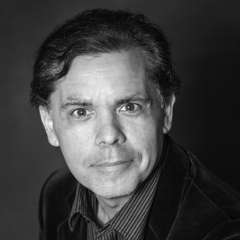This programme tied together two revered late works by two great, and greatly contrasted, composers. Mozart's autumnal Clarinet Concerto looks back on a full life with equal measures of engagement and reflection, while Bruckner's valedictory, and incomplete, final symphony (dedicatee:God) looks forward, to a life beyond the mortal one. Both are familiar, and perhaps over-programmed works, so the challenge for the CBSO under conductor James Feddeck was to offer fresh insights while avoiding the routine.
Their cause was aided greatly in the Mozart by soloist Michael Collins' choice of the basset clarinet, for which the concerto was written, in preference to the smoother tones of the modern instrument. This gave the solo part an arresting edge which contrasted with the hushed orchestral accompaniment – reined back almost to a whisper during the Andante –and served equally well in the more extrovert outer movements: the gallop of the finale was especially piquant. Collins, genial and earthy next to Feddeck's more ascetic presence on the podium, proved himself a stalwart advocate for the piece, as powerful when playing in concert with the orchestra as in his spotlit solo role. This was a performance as alert and life-enhancing as anyone could wish for: the bear traps of blandness were sidestepped with agility.
Of all Bruckner's works, the 9th symphony best exemplifies the critical standby phrase 'cathedral of sound'. We are as well-acquainted with the phrase as we are with the work, yet it persists for a reason. The atmosphere conveyed by Bruckner's sound world is akin to the sensation we feel when entering such a building – that sense of feeling almost obliged to hold the breath, at least as a token of respect for the hours of devotional labour that went into its construction. Those looking for Bruckner's lighter side will search in vain: he didn't have one. But he did occasionally send his congregation out into the fields, to hunt, or to climb mountains, or just to breathe the fresh air. There is another view of Bruckner, which places as much emphasis on the view from the stained glass windows as it does on the granite of the walls and foundations.
Feddeck – an emerging talent who is acquiring a reputation for salvaging concerts when the advertised conductor is indisposed - offered intermittent glimpses of this other Bruckner, without achieving the last degree of individuality that makes for a truly memorable performance. Perhaps what was missing was the element of ease between conductor and band that can only come with repeated encounters? But considering this was his debut with the orchestra, Feddeck impressed with his authority and sense of architecture: Bruckner's long paragraphs, jolting pauses and sudden, eloquent silences were all made to seem entirely natural and unforced.
After a somewhat turbulent 'take-off', with the opening horn chorale cautiously articulated, the transition to the second subject was made smoothly with some very fine work from the strings. Along the way, much orchestral detail was revealed that too many performances overlook. Feddeck downplayed the bombast of the Scherzo, which became less the aural depiction of hell some interpreters like to make it and more of a long march over rough terrain, with a rest break (the trio) in the middle. The contrasting music of the trio, with its disturbing and otherwise un-Brucknerian sensuality was vividly characterised by the strings in combination with the woodwind. Although I've heard far weightier accounts of this movement, Feddeck's approach worked through its combination of toughness and ethereality.
The final Adagio showed conductor and orchestra at their finest. Most impressive was the solo violins' harrowing depiction of the 'cry of anguish' at the start of the movement. Aside from some scrappy ensemble between the horns and the Wagner tubas, the balance between the different sections was impeccable and there was an almost Viennese lilt to the strings. There was no sense of incompleteness in this performance as Feddeck and his forces brought the piece home in a blaze of sound that shook Symphony Hall to tis foundations.
On this evidence, Feddeck is an impressive developing talent who would benefit from a permanent position with a good orchestra: Birmingham might have been a good fit for him had they not already appointed their next chief. I hope he will be able to put his days as a 'takeover artist' behind him as soon as possible and reap the benefits of a symbiotic, permanent relationship with a first-rate band.


